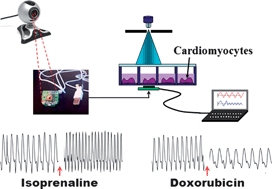Identifying drugs that have the potential to cause heart dysfunction as early as possible is crucial for preventing the waste of time and money in drug discovery processes.
Cell-based biosensors using living cells have been applied in pharmacological screening, but current technologies encounter difficulties such as small measurement areas, complicated fabrication procedures and high costs. However, the rapid development of digital consumer technologies has driven down the cost and created compact imaging sensor modules such as CMOS (complementary field oxide semiconductor) imaging senors.
In this HOT article, Ali Khademhosseini (Harvard Medical School) and colleagues made use of this development, extracting the CMOS sensor from a webcam and using it with an image processing algorithm to measure cardiotoxicity in cardiomyocytes. They were able to detect beat-to-beat variability in real-time after treatment with drugs iosprenaline and doxorubicin.
The authors hope this neat system may be useful for a range of cell-based biosensing applications.
Download the article for free for 4 weeks:
A cell-based biosensor for real-time detection of cardiotoxicity using lensfree imaging
Sang Bok Kim, Hojae Bae, Jae Min Cha, Sang Jun Moon, Mehmet R. Dokmeci, Donald M. Cropek and Ali Khademhosseini
Lab Chip, 2011, 11, 1801-1807
DOI: 10.1039/C1LC20098D, Paper











